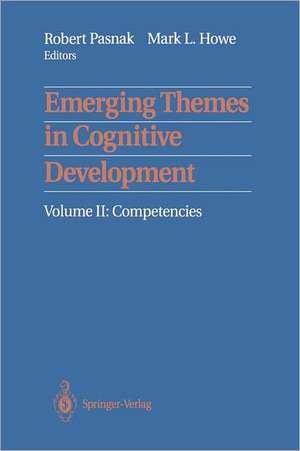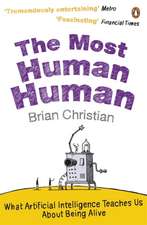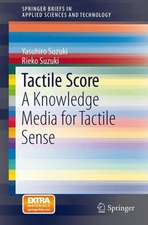Emerging Themes in Cognitive Development: Volume II: Competencies
Editat de Robert Pasnak, Mark L. Hoween Limba Engleză Paperback – 13 oct 2011
| Toate formatele și edițiile | Preț | Express |
|---|---|---|
| Paperback (2) | 644.48 lei 6-8 săpt. | |
| Springer – 13 oct 2011 | 644.48 lei 6-8 săpt. | |
| Springer – 14 oct 2011 | 716.65 lei 6-8 săpt. |
Preț: 644.48 lei
Preț vechi: 805.60 lei
-20% Nou
Puncte Express: 967
Preț estimativ în valută:
123.32€ • 128.76$ • 102.06£
123.32€ • 128.76$ • 102.06£
Carte tipărită la comandă
Livrare economică 05-19 aprilie
Preluare comenzi: 021 569.72.76
Specificații
ISBN-13: 9781461392255
ISBN-10: 146139225X
Pagini: 276
Ilustrații: XIX, 253 p.
Dimensiuni: 155 x 235 x 14 mm
Greutate: 0.39 kg
Ediția:Softcover reprint of the original 1st ed. 1993
Editura: Springer
Colecția Springer
Locul publicării:New York, NY, United States
ISBN-10: 146139225X
Pagini: 276
Ilustrații: XIX, 253 p.
Dimensiuni: 155 x 235 x 14 mm
Greutate: 0.39 kg
Ediția:Softcover reprint of the original 1st ed. 1993
Editura: Springer
Colecția Springer
Locul publicării:New York, NY, United States
Public țintă
ResearchDescriere
Emerging Themes in Cognitive Development presents two volumes of the newest research and theory in cognitive development available at the outset of the 1990s. These ideas are firmly rooted in research from the 1980s and, in some sense, these volumes represent a culmination of that research and of even earlier work. Nevertheless, these volumes are offered as catalysts more than summaries, because each presents the freshest and most recently gathered data of many scientists whose insights have had an important impact on the field. The latest ideas of these researchers will, in some cases, immediately prove to be dominant themes of research and theory. In other cases, of course, it will take longer for the concepts presented to capture the imagination of students and colleagues who are still invested in meritori ous research on other themes. In either case, the syntheses and innova tions proposed are not likely to escape the careful study of the serious scholar, and it is to such scholars that these volumes are dedicated.
Cuprins
I. New Definitions of Competence.- 1. Categories and Causality.- Causality as a Developmental Primitive.- Causality as a Central Component to Categories.- The Developmental Picture.- Conclusions..- References.- 2. The Cognitive Basis of Dyslexia.- Definitional Issues.- Basic Cognitive Processes in Reading.- Phonological Processing.- Syntactic Awareness.- Working Memory.- Other Processes.- Summary.- References.- 3. Project Spectrum: A Theory-Based Approach to Early Education.- Theoretical Foundations.- Spectrum’s Assessment System.- Implications for Curriculum Development.- Future Directions.- Conclusions.- References.- II. Advances in Competence.- 4. “I Watch, Therefore I Can Do”: The Development of Meta-Imitation During the Preschool Years and the Advantage of Optimism About One’s Imitative Skills.- Young Children’s Estimation of Their Cognitive Abilities.- Study 1: A Diary Study of Preschool Children’s Meta-Imitation.- Study 2: Meta-Imitation in a Preschool Environment.- Study 3: An Experimental Assessment of the Development of Meta-Imitation.- The Development of Meta-Imitation and the Adaptive Nature of Cognitive Immaturity.- Conclusions.- References.- 5. Parental Influences on Children’s Cognition.- Theoretical Background.- Relationships and Social Interaction.- Paradigms to Investigate Parental Influences on Cognitive.- Development.- A Model of Parental Influences on Children’s Cognition.- Research on Parental Style and Performance.- Conclusions and Suggestions for Further Research.- References.- 6. Memory Strategies: Natural Development and Use Following Instruction.- There Isn’t an Agreed Upon Definition of Strategy, Is There?.- Don’t Strategies Develop Naturally During the Elementary School Years?.- Are Failures to Use Strategies Production Deficiencies?.- Improved Strategic Competence or Increases in Accessible Knowledge?.- What About the Durability of Strategy Instruction Effects?.- Isn’t a Lot of It Motivation?.- Summing Up: What We Now Believe About Natural Development of Memory Strategies and Development of Strategic Competence via Instruction.- References.- 7. Applying Cognitive Developmental Principals in Classrooms.- Historical Links Between Scientific Psychology and Education.- Models Driving Current Educational Practice.- Targeting Cognitive Processes for Instruction.- The Process of Instruction.- Concluding Comments.- References.- 8. Organizing Principles of the High/Scope Curriculum.- History of the High/Scope Curriculum.- The High/Scope Perry Preschool Study.- Preschool Curriculum Approaches.- The High/Scope Preschool Curriculum Study.- High/Scope Curriculum Framework.- Why the High/Scope Curriculum Works.- Summary.- References.- III. Afterword.- 9. New Approaches to the Development of Cognitive Competence.- Definitions of Cognitive Competence.- Advances in Cognitive Competence.- Emerging Trends.- References.- Author Index.
















